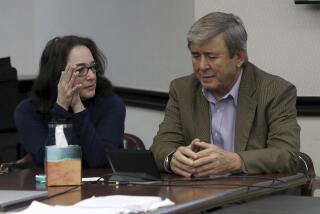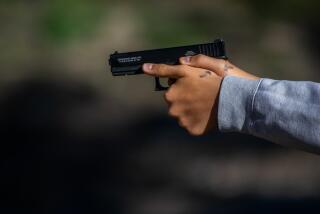Great Read: Parent of Columbine victim sees reminder of his ordeal in Isla Vista
- Share via
The big shootings still find their own awful way of hitting him.
When he heard about the massacre of 26 children and adults in Newtown, Conn., in 2012, Tom Mauser fled to his office and cried.
Two Saturdays ago, Mauser was at home when his wife, Linda, called out, “Tom, did you hear what happened?”
“What now?” Mauser responded. This time, six UC Santa Barbara students were killed in Isla Vista by another troubled young man.
After all these years, Mauser can’t ignore the shootings. Reporters still call, asking him what he thinks, what he feels.
So it was with sympathy, sadness and admiration that Mauser watched TV in his kitchen in Littleton, Colo., as a distraught Richard Martinez condemned the National Rifle Assn. after the fatal shooting of his son, Christopher Michaels-Martinez, near UCSB.
“Wow, he is one strong dude,” Mauser thought. “Oh, boy, is he now going to be deluged.”
Mauser would know.
Fifteen years ago, he also was unwittingly drafted into the nation’s battle over gun violence.
Fifteen years ago, Tom Mauser also lost a son.
::
Daniel Connor Mauser was born on June 25, 1983, and was the Mausers’ firstborn. Blond, gangly and full of goofy energy as a boy, he grew up to be a pretty good student in math and science.
Daniel was sometimes a worrier; he’d point out when his parents’ gas tank was low. He was not athletic but joined Columbine High School’s cross-country team. He was shy, yet joined the school’s debate squad.
In a memoir that Tom Mauser wrote, he recounted that, one night, after Daniel casually chatted about gun control laws with his debate friends, he came home and asked, “Dad, did you know there are loopholes in the Brady bill?”
Two weeks later, on April 20, 1999, Daniel was fatally shot in the face in the school library as Eric Harris and Dylan Klebold went on a rampage at Columbine, killing 12 students and a teacher before committing suicide.
Tom Mauser was at work that day. A co-worker came in, asked him where he lived, whether he had teenage kids, whether his son went to Columbine — and then told Mauser he better go watch the news.
Everyone was standing around the TV. There was Columbine, under siege by police.
Mauser met up with his wife and headed to a school that was serving as a gathering point. Other children eventually had tearful reunions with their parents.
By nightfall, the Mausers still hadn’t heard from their son. But they heard from the police, who said they needed Daniel’s dental records.
::
In trying circumstances that would become an all-too-familiar pattern in the years to come, the crush of news media around the Mausers and the other Columbine families was suffocating and immediate.
Food, flowers and hundreds of messages of sympathy poured in, including letters addressed simply to “Daniel Mauser’s Family, Littleton, Colo.” that managed to find their house anyway.
The Mausers were overwhelmed by the attention and the grief. But it didn’t take long for Tom Mauser to wonder whether gun laws were strong enough.
He began to see his son’s question about the Brady law as a portent.
The firearm that killed Daniel had been bought at a gun show without a background check — “through one of those gaping loopholes in the Brady bill,” his father wrote of the national gun control law that passed in 1993.
Soon after the shooting rampage, Mauser was disturbed by the pro-gun letters to the editor appearing in the Denver Post; he remembered, with regret, that he called the authors and scolded them for their views.
He was further angered when the NRA convention came to Denver just 11 days after the Columbine shootings. There, the group’s leader, Charlton Heston, called gun control advocates “screeching” and said the NRA would not stop fighting new gun control laws.
That’s when Mauser decided to make his first public remarks about his son’s death and addressed protesters outside the convention. He could not bring back his son. But perhaps he could help save other children.
Within three weeks of his son’s death, Mauser spoke against gun violence at the White House, standing at a lectern a few feet from then-First Lady Hillary Rodham Clinton as he recited in alphabetical order the names of those killed at Columbine.
He accidentally forgot two students’ names and hastily added them at the end — a momentary omission that inflicted him with lasting embarrassment.
“It was a terrible, terrible guilt,” Mauser said in an interview in Denver last week. “Like, how could I do that?” He was a child of the ‘60s, a believer in civil rights, and the two students he momentarily overlooked had been the only minorities killed at Columbine.
At home, the emotional healing took on a similarly complex path for the family.
Mauser was both haunted and blessed by recurring dreams in which his son returned; he would then wake up and feel a terrible hollowness.
His wife, Linda, proposed adopting a child. The couple would add a second daughter to their family: Madeline, an abandoned baby in China.
“We clearly don’t see Madeline as a ‘replacement’ for Daniel — no one could ever replace him,” the family wrote in a tribute website set up for Daniel. “Is it a difficult thing to take on? Sure, but unless you’ve lost a child, it’s hard to understand.”
They also decided that it would be healthier to clear out a few of Daniel’s things, which is when Mauser realized he wore the same clothing size as his son. He began to put on a pair of Daniel’s size 10 1/2 Reeboks for gun control events. Sometimes he wore them around the house.
Later, when authorities returned the shoes Daniel had been killed in — black-and-gray Vans — Mauser began wearing those instead to gun control events. He still does.
::
The Columbine massacre was far from the first school shooting in the 1990s, but its effect was long lasting and widely felt.
Schools ramped up security measures. Police started training officers to rush into a building rather than set up a perimeter as they had at Columbine. Perhaps most troubling, teen boys and young men around the country began to cite Columbine in plotting their own attacks.
And just as mass shootings and the NRA’s opposition to stricter gun control have since become facts of American life, the activist families of victims have also become a vocal, closely bonded archetype.
“You end up having a family, a very sad family. It’s a club you can’t resign from,” said Sandy Phillips, a friend of Tom Mauser’s and mother of Jessica Ghawi, who was killed in the 2012 Aurora, Colo., theater shooting.
Phillips and her husband, Lonnie, spoke with Richard Martinez over the phone shortly after the Isla Vista attack. Martinez realizes that he has a limited time in the spotlight before attention wanes, Lonnie Phillips said.
“He’s not going to waste a minute of his time,” Lonnie Phillips said. He’s “going to be a face and voice in this movement; he’s angry.”
Mauser knows what Martinez can expect to come next. It’s not all condolences.
Mauser’s friction with gun rights advocates was swift after Columbine. He has been arrested twice at NRA headquarters on suspicion of trespassing during protests, and he says that opponents have frequently harassed him, often signing him up for subscriptions to magazines such as Guns & Ammo.
For a year, he took a leave from his job at the state Department of Transportation to become a gun control lobbyist in Colorado’s Capitol — admittedly not a very good one, he says.
But after the state Legislature declined to pass a requirement for background checks at gun shows, Mauser and his new allies successfully pushed the issue on a state ballot measure. Amendment 22 won 70% of the vote in 2000.
Since the loss of his son, Mauser says, that law is his proudest achievement other than adopting Madeline. Further changes, however, have been a struggle.
After the mass shootings at Newtown, Aurora and elsewhere, Colorado passed more laws to limit gun magazine sizes to 15 rounds and strengthened background check requirements. But the legislation came at a price. Two Democratic state senators who voted for the measures were recalled by angry voters, and a third resigned.
At the national level, Congress, facing strong opposition from the NRA, declined to expand background checks despite polls showing widespread support.
“I thought there was a chance things would change in a small way after Newtown, but … unfortunately it’s going to take an awful lot to change people’s minds,” Mauser said.
::
At home, Mauser keeps hundreds of newspaper clippings about gun violence big and small; this is his way of organizing and tracking violence, with every shooting a new defeat.
Mauser likes to think he honors his son by moving ahead in life; not in moving on, but in living on and in keeping up his fight for gun control.
“When you get in this movement as strongly as some of us have, you realize you’re in this for life,” Mauser said. “I don’t feel I have a choice.”
After major shootings, he fields calls from gun control advocates seeking support and from grieving family members seeking advice.
He would like to speak with Richard Martinez about what comes next — but only if, and when, Martinez is ready.
Times staff writers Adolfo Flores and Kate Mather contributed to this report.
More to Read
Sign up for Essential California
The most important California stories and recommendations in your inbox every morning.
You may occasionally receive promotional content from the Los Angeles Times.











